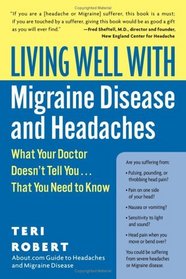Wendy N. reviewed Living Well with Migraine Disease and Headaches : What Your Doctor Doesn't Tell You...That You Need to Know on + 177 more book reviews
Helpful Score: 2
The main advice of this book is to continue trying various medications and/or doctors until you find one or more that get your migraines under control. She explains the differences among the preventative medications on the market, as well as several abortive medications.
This is a good book for the migraneur who feels isolated by people who don't understand the magnitude of the problem because it is invisible. However, I did feel the author gave short shrift to non-medical treatments, such as chiropractic, theraputic massage, and dietary changes. She does mention some holistic approaches, but it is obvious she has tried these and dismissed them as ineffective. She has decided that migraines are akin to epilepsy, and therefore must be treated as a disease rather than a symptom of a more systemic health problem.
I did learn a few things from the book, though. For example, excessive yawning may be a warning sign of an oncoming migraine. The author also claims that depression is much more prevalent among migraine sufferers (47% have depression vs 17% in the general population), which may be why I get more migraines in the wintertime, since I am susceptible to seasonal affect disorder.
Anyway, a decent overview of the medical approach to migraine treatment.
This is a good book for the migraneur who feels isolated by people who don't understand the magnitude of the problem because it is invisible. However, I did feel the author gave short shrift to non-medical treatments, such as chiropractic, theraputic massage, and dietary changes. She does mention some holistic approaches, but it is obvious she has tried these and dismissed them as ineffective. She has decided that migraines are akin to epilepsy, and therefore must be treated as a disease rather than a symptom of a more systemic health problem.
I did learn a few things from the book, though. For example, excessive yawning may be a warning sign of an oncoming migraine. The author also claims that depression is much more prevalent among migraine sufferers (47% have depression vs 17% in the general population), which may be why I get more migraines in the wintertime, since I am susceptible to seasonal affect disorder.
Anyway, a decent overview of the medical approach to migraine treatment.





